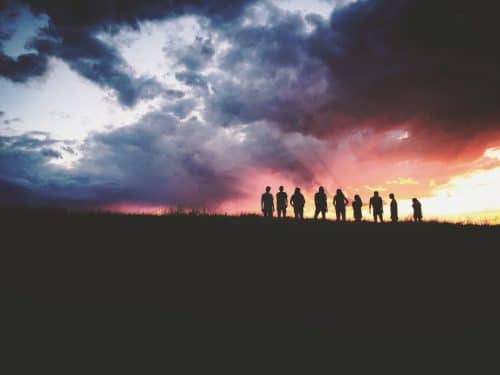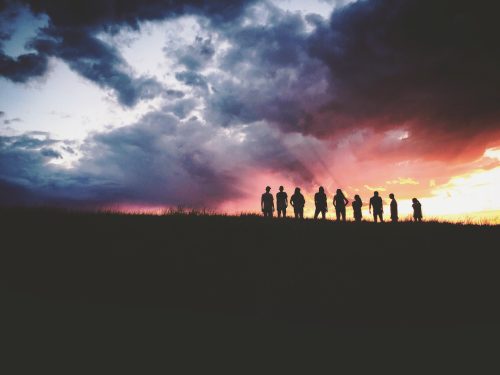
I must admit that I have been one of the handwringers. As I have watched a generation of people that I worked with in the youth group over the last two decades walk away from the church and organized religion, I have been plagued by the thought of “What did we do wrong?” They are good humans who volunteer, love their families, and have a strong moral compass; however, they are not found in regular attendance at the same kind of multigenerational church communities that shaped them. Why not?
In a quest for understanding, I read Ryan P. Burge’s The Nones: Where They Came From, Who They Are, and Where They Are Going, an in-depth statistical look at this category of people and how it has changed through the years. I thought knowing more about the phenomenon might lead me to some magical answer as to what to do. Of course, there is no one solution to the larger issue. However, there may be one solution for each individual “none,” and we can all play a part in connecting with those around us.
Personally, I could not stop thinking about the “nones” who grew up in the church, but after walking away did not have the same kind of access to theological instruction for their children. Rather than rail against them as parents for not having their children in church (which is the same kind of judgment that landed some of them outside the church in the first place), I wanted to find a way to help them teach their children how to think spiritually inside their own homes. Parental discipleship has long been known as a key factor in children’s faith formation.
I took what I knew of education and raising my own children to write a spiritual formation book, God is Here. Since a large portion of the “nones” do believe in a divine creative power, the book includes a lyrical poem about encountering God in nature through the five senses. I did not stop there, though, because I wanted to make sure that the parents felt comfortable learning to talk about God and the Spirit with their young children. So, on each page, I wrote a short fact about the element of creation as well as a way to think about it theologically. I included some questions that caregivers could ask children to get them thinking about how faith and creation are intertwined.
At first, I thought that it would be a nice thing to share with a few people at church to pass along to their families, but as I worked through the process, I kept noticing the nudges to take this little project to the next level. A particular quotation by Brian McLaren in Faith After Doubt spurred me onward: “You may be surprised to hear me say that I think it will be an absolute spiritual necessity to expose children to nature and to build in them, from the youngest age possible, a lifelong sensitivity to the patterns of the natural world. If we think of God as both the creator of the cosmos and the source of love, then it sounds ludicrous to think we could encounter God and divine love apart from God’s creative project.”
These words resonated with me, and I became convinced of the necessity of providing resources for families amid deconstructing and/or reconstructing faith. We simply need more ways for the church to reach beyond its walls to the everyday lives of the spiritually inclined. My deep hope is that in some way this group of “nones” will actually help transform our churches to be better — more life-giving, self-sacrificial, and hope-inducing.
After all, as the church, we kind of created this mess in the first place. We preached salvation as a finish line to our youth over the last three decades — emphasizing that the main point of church was to be saved. As we siloed them away into youth programming, we left them with no template on how to live as a larger community after that one defining moment. Why should it matter if they missed church week after week and did not participate in activities to bring the kingdom of heaven to earth when they thought they had reached the finish line already? We left them believing that after a statement of faith they just generally had to be a good person and give to some charitable causes — activities which can be done on one’s own.
We did not emphasize enough that a profession of faith was a first step in working toward a just society together. We forgot to emphasize that a life of discipleship needs to be found in a community of believers. As Miguel De La Torre says, “We see the real trouble when we are more concerned with personal professions of faith than public ones.” A community of faith is designed to challenge us and grow us into more faithful disciples, but they do not work if you do not show up. The accountability of community is key in shaping us more into the likeness of Christ.
Hudson Hintze / Unsplash
Instead, a generation of parents, educators, and coaches thought shaping young people into the likeness of a certain athlete, artist, dancer, or scholar was more important and showed them that by ramping up the hours associated with extracurricular activities. Strong communities grow up around these activities which satisfy our needs for a time, but they are mostly temporary and leave young adults without a more permanent type of community to address the big questions of life. Wary of institutions to start with, they drift along between activities and friend groups without the stability that a church fellowship can provide. Some of the ones that have continued going to church have congregated toward lower-stakes worship experiences with loose ties to a community.
So how do we course correct?
First, we must normalize talking about religion and faith. This simply must not be a taboo topic anymore. We have a long way to go in a world of polarization where everyone is a heretic to someone. For those that remain in the church, we need to approach from a perspective of curiosity and ask more questions than we give answers. People are still wrestling with the big questions of life: Who am I? Where do I belong? Why am I here? Is there more to this world than what I can see? We do not need to have all the answers. Instead, we need to be a loving presence. Keep our messages simple about hope, love, reconciliation, justice — love God, love neighbor.
It is going to take each of us to find the one thing that we can do to continue to bring theological discussions. Finding a way to share your story is probably the most impactful. Your thing may not be to write a children’s book like mine was. The possibilities, though, are endless. I appreciate the work of podcasters that are taking on the notion of deconstructing and reconstructing faith. Social media can be a place to share spiritual practices or meaningful stories of faith communities. One might share a book on spiritual formation with a friend or lead a book study. Neighbors can support young families through meals or childcare. I know that I always love those that love and care for my children! I am thankful for grandparents that get up extra early on Sunday mornings to make sure their grandchildren get to church.
Most millennials and Gen Zers are supportive of the charitable work that churches do, and this is often a place they will plug in — even if you do not see them on Sunday mornings. We can show others how we connect our Christian spirituality to our yoga practice or daily walks. There are wonderful workplace mentors that are living their faith and looking for co-workers in need to shepherd. This is our chance to be out in the world rather than sequestered inside church walls, much like the early church we read about in Acts.
Handwringing is not going to accomplish anything. The Nones need us. Just like Paul stood on Mars Hill in Acts 17:22-31 and announced to the people of Athens that he knew the “Unknown God” mentioned on the altar there, we too can reintroduce the triune God to the spiritual and not religious in a way that encourages a return to community. What is the best way you can speak to this community? How can you mentor someone using your talents and giftedness? How can we help the NONES become ONES in Christ again?
Sarah Blackwell is a contributing writer at Word & Way and a 2020 graduate of the Gardner-Webb School of Divinity. She is adjunct instructor in the Religion and Philosophy Department at Wingate University in Wingate, NC. She enjoys working with youth and young adults at Providence Baptist Church-Charlotte. Her book, God is Here is available through Amazon and other online book retailers. Follow her writings at www.proximitytolove.org.

